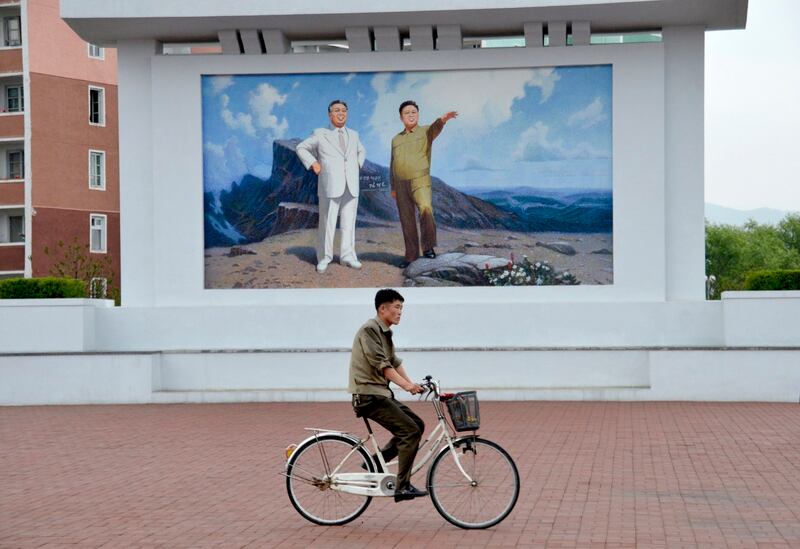Rural citizens in North Korea are angry that their government is building mosaic murals at their expense that idolize the ruling Kim family at a time when people are struggling to find their next meal, sources in the country told RFA.
Chronically short of food, the country of 25 million has seen starvation deaths in the wake of the closure of the Sino-Korean border and suspension of trade with China in January 2020 to prevent the spread of COVID-19. Authorities told the public that they are on their own to find food, RFA reported previously.
Giant murals depicting leader Kim Jong Un’s father and predecessor, Kim Jong Il; grandfather and national founder Kim Il Sung; and the eldest Kim’s first wife, Kim Jong Suk, are commonplace in the country where the members of the Kim family enjoy almost god-like status due to a firmly entrenched cult of personality.
The murals are a common feature of major thoroughfares in cities, but the government is ordering them in the countryside for the first time, sources said.
“These days, the people are all complaining about this idolization project, which must be completed by the end of October,” a resident of Musan county in the northeastern province of North Hamgyong told RFA’s Korean Service Sept. 23.
As with almost all public projects, the government is forcing local citizens to donate their time, money or materials for the murals.
“With this mural installation, the people’s dissatisfaction with the country has reached its peak,” the source said.
“The residents are suffering from major livelihood difficulties but now we have to pay 20,000 won (U.S. $3.28) in ‘loyalty funds’ per household, and we must also provide cement and prepare meals for the construction workers,” said the source.
The design of the new murals is still a secret. The source said nobody knows if the three figures will be depicted as usual or if they will present a new design.
“But nobody cares about the design in these difficult times, because they have more important things to worry about,” the source said.
“Due to the COVID-19 pandemic and the resulting border closure, most people are at the crossroads of life and death every day due to these food shortages. In such an emergency, the people are outraged that the government is burdening them by extorting money for the murals,” said the source.

Another source, a party official from Chunggang county in the northern province of Chagang, told RFA that the collection of funds in his jurisdiction has begun.
“The murals will be built at the borders of each county and at the borders between each district,” said the official, who requested anonymity to speak freely.
“We already have mosaic murals at several industrial sites in Changang province, including timber processing facilities in Chasong and Kopung counties, and mines and timber processing plants in the cities of Kanggye and Yanggye, so I don’t understand why they are telling us to build more at the boundaries of districts,” said the second source.
North Korea’s government has told citizens to prepare for a “second Arduous March,” referring to the 1990’s North Korean famine which killed as much as 10 percent of the country by some estimates. The second source said citizens in Chagang have begun referring to the current crisis that way.
“Many residents are perplexed because the state is passing on the cost of installing idolization murals to the residents instead of taking care of their livelihood at a time like this,” said the second source.
“The people say things like, the murals aren’t going to give us rice, and the government is against the people, making us do this project to deceive us. The people must pay to idolize our leaders when they cannot even get basic food and medicine,” the second source said.
Reported by Jeong Yon Park for RFA’s Korean Service. Translated by Leejin Jun. Written in English by Eugene Whong.
